
International Journal of Thermodynamics
Scope & Guideline
Exploring the Frontiers of Energy and Materials Science
Introduction
Aims and Scopes
- Fundamental Thermodynamics:
The journal focuses on the principles and laws of thermodynamics, including classical and statistical approaches, emphasizing their theoretical foundations and applications. - Energy Systems and Optimization:
Research on the optimization of energy systems, including renewable energy technologies, heat exchangers, and engines, is a core theme, addressing efficiency improvements and sustainability. - Thermal Properties and Phase Behavior:
The journal publishes studies on the thermal properties of materials, phase transitions, and equilibrium states, contributing to the understanding of thermodynamic behavior in various substances. - Computational and Experimental Methods:
A significant focus is placed on both computational simulations (e.g., CFD, molecular dynamics) and experimental investigations that validate theoretical models and enhance practical applications. - Environmental and Economic Impact:
Research addressing the environmental implications of thermodynamic processes and the economic feasibility of energy technologies is highlighted, reflecting a growing concern for sustainability.
Trending and Emerging
- Renewable Energy Systems:
An increasing number of publications focus on the integration and optimization of renewable energy systems, such as solar and geothermal, showcasing their potential in addressing global energy challenges. - Advanced Refrigerants and Heat Transfer Technologies:
Research on alternative refrigerants and advanced heat transfer technologies is on the rise, highlighting the industry's shift towards eco-friendly solutions and improved energy efficiency. - Energy Storage and Thermal Management:
Emerging studies on energy storage solutions, including thermal energy storage systems, are gaining traction, reflecting the need for effective energy management in fluctuating energy markets. - Thermodynamics in Biological Systems:
There is a growing trend towards applying thermodynamic principles to biological systems, including studies on bioprocessing and biofuels, which indicate a broader application of thermodynamics in life sciences. - Data-Driven and Machine Learning Approaches:
The incorporation of machine learning and data-driven methodologies in thermodynamic research is emerging, providing new tools for analysis, optimization, and predictive modeling in various applications.
Declining or Waning
- Traditional Refrigeration Techniques:
There has been a noticeable decrease in studies focusing solely on traditional refrigeration methods, as the field shifts towards exploring more sustainable and innovative refrigerants and systems. - Basic Chemical Thermodynamics:
Research centered on classical chemical thermodynamics, without integrating modern computational techniques or applications, has diminished, indicating a preference for more applied and interdisciplinary approaches. - Static Thermodynamic Models:
The use of static models that do not account for dynamic or transient behaviors in thermodynamic systems has become less frequent, as researchers increasingly favor dynamic modeling techniques that provide a more realistic representation of processes.
Similar Journals
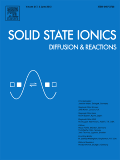
SOLID STATE IONICS
Transforming knowledge into practical applications.SOLID STATE IONICS, published by Elsevier, is a prestigious academic journal dedicated to the field of solid state ionics. Since its inception in 1979, the journal has steadily contributed to the advancement of knowledge regarding ionic conduction in solid materials, which is paramount in a multitude of applications, from energy storage systems to sensor technology. As evidenced by its strong ranking in 2023—positioned in the Q2 quartile across Chemistry, Condensed Matter Physics, and Materials Science—SOLID STATE IONICS is recognized as a vital resource for researchers, professionals, and students alike, providing high-quality peer-reviewed articles that foster scientific collaboration and innovation. Its ISSN is 0167-2738 and E-ISSN is 1872-7689, with an ongoing publication schedule aimed at featuring cutting-edge research through 2024. As an essential conduit for the dissemination of important findings in the field, researchers seeking to publish their work or explore new frontiers in solid state ionics will find this journal an invaluable resource.
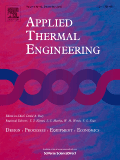
APPLIED THERMAL ENGINEERING
Elevating thermal science through rigorous research and collaboration.Applied Thermal Engineering is a leading international journal dedicated to the field of thermal engineering, published by Pergamon-Elsevier Science Ltd. With an impressive impact factor indicating its significance in the academic community, this journal focuses on innovative research and developments related to energy engineering, fluid flow, and transfer processes, as well as manufacturing and mechanical engineering. Being indexed in top quartiles (Q1) across multiple categories, it ranks exceptionally well on platforms like Scopus, ensuring that contributors reach a wide and relevant audience. The journal supports both open access and subscription options, promoting the dissemination of vital research findings from 1996 to 2024. With its commitment to advancing the discipline and implementing rigorous peer-review processes, Applied Thermal Engineering serves as an essential resource for researchers, industry professionals, and students aiming to stay abreast of the latest advancements and applied methodologies in thermal science.
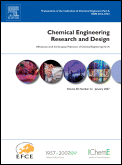
CHEMICAL ENGINEERING RESEARCH & DESIGN
Exploring the Depths of Chemical Innovations.CHEMICAL ENGINEERING RESEARCH & DESIGN is a prestigious journal that has been at the forefront of dissemination in the fields of chemical engineering and general chemistry since its inception in 1983. Published by Elsevier, the journal features a rich array of research articles that contribute to both theoretical and practical advancements in the discipline. With an impact factor that positions it strongly within the Q2 quartile for both Chemical Engineering and Chemistry categories, it occupies an esteemed place in the academic community, being ranked #77 out of 273 in Chemical Engineering and #111 out of 408 in General Chemistry on Scopus. Researchers and professionals will find it an invaluable resource for cutting-edge research and innovative methodologies that shape the future of chemical engineering applications. While the journal does not currently offer open access, it remains accessible through institutional subscriptions, ensuring that important findings continue to reach a broad audience. With a scope that is poised to expand through 2024, the journal aims to foster collaboration and knowledge sharing, supporting the continuous evolution of the field.

Processes
Unleashing potential through interdisciplinary research.Processes is an esteemed open-access journal published by MDPI, dedicated to advancing the understanding and application of scientific principles within the realms of bioengineering, chemical engineering, and process chemistry and technology. Founded in 2013 and based in Basel, Switzerland, this journal aims to foster rigorous research dissemination without the barriers of traditional publishing, making a diverse array of scholarly articles accessible to the global scientific community. With an impressive standing in the academic landscape, Processes is classified in 2023 within prestigious quartile rankings, including Q2 in Chemical Engineering (miscellaneous) and Q3 in both Bioengineering and Process Chemistry and Technology, reflecting its relevance and contribution to these dynamic fields. The journal welcomes submissions that not only present innovative methodologies and experimental findings but also encourage interdisciplinary collaboration and knowledge sharing among researchers, professionals, and students. As of recent metrics, it ranks favorably within Scopus, reinforcing its impact and relevance for ongoing research and development in these disciplines. Explore Processes as a source of inspiration and knowledge for your next scientific endeavor.

Annual Review of Condensed Matter Physics
Curating Excellence in Theoretical and Applied ResearchThe Annual Review of Condensed Matter Physics, published by Annual Reviews, is a leading journal dedicated to advancing understanding in the field of condensed matter physics and materials science. With an impact factor that reflects its esteemed position—ranking in the top quartile (Q1) across both condensed matter physics and miscellaneous materials science categories—this journal serves as a crucial resource for researchers and professionals seeking the latest insights and comprehensive reviews in these dynamic areas of study. The journal spans an impressive range of topics from theoretical developments to applied research, aiming to create a rich dialogue among academia and industry. With consistent publication from 2010 to 2024, it curates high-quality, peer-reviewed articles that set a benchmark for excellence in the scientific community. Engaging both established professionals and emerging scholars, the Annual Review of Condensed Matter Physics is pivotal in shaping the discourse and fostering innovation in condensed matter research.

Transactions of the Korean Society of Mechanical Engineers B
Innovating solutions for a dynamic engineering landscape.Welcome to the Transactions of the Korean Society of Mechanical Engineers B, a pivotal journal dedicated to advancing the field of mechanical engineering. Published by the esteemed Korean Society of Mechanical Engineers, this journal serves as a platform for the dissemination of innovative research and practical applications in mechanical engineering and related disciplines. With a focus on fostering knowledge exchange and collaboration, the journal publishes original research articles, reviews, and technical notes that contribute to the understanding and evolution of mechanical systems and technologies. The Transactions of the Korean Society of Mechanical Engineers B, which has been in circulation since 2007 and spans through 2024, is categorized within the Q4 quartile of mechanical engineering rankings and is indexed by Scopus, making it a valuable resource for researchers and professionals aiming to stay abreast of the latest developments in the field. Although it is not open access, its rigorous peer-review process ensures the integrity and quality of the published work, making it essential reading for academics and practitioners alike.
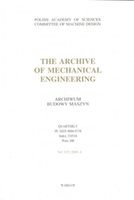
Archive of Mechanical Engineering
Connecting Scholars through Open Access InsightsThe Archive of Mechanical Engineering, published by Polska Akademia Nauk (Polish Academy of Sciences), is a distinguished platform for disseminating cutting-edge research in the fields of Mechanical Engineering and Mechanics of Materials. Since its inception, the journal has evolved and embraced an Open Access model since 2010, thereby enhancing accessibility and fostering wider dissemination of knowledge among researchers, professionals, and students globally. The journal covers a broad spectrum of topics, ensuring that vital advancements in mechanical engineering are communicated effectively. Recognized as a Q3 category journal in both its relevant categories as of 2023, the Archive continues to establish itself with a competitive Scopus Rank, aiming to elevate the standard of research and innovation. By merging historical insights with contemporary advancements, the journal serves as an essential resource for those seeking to delve into the evolution and future of mechanical engineering.
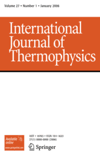
INTERNATIONAL JOURNAL OF THERMOPHYSICS
Advancing Knowledge in Thermophysical ApplicationsInternational Journal of Thermophysics, published by Springer/Plenum Publishers, is a premier platform for the dissemination of high-quality research in the field of thermophysics, particularly focusing on the intricate relationships between thermal properties and their applications across various scientific disciplines. With an ISSN of 0195-928X and an E-ISSN of 1572-9567, the journal has established a respected presence in the academic community since its inception in 1980, with a converged publication timeline extending to 2024. Categorized in the Q2 quartile for Condensed Matter Physics in 2023 and maintaining impressive Scopus rankings—such as #39 in Fluid Flow and Transfer Processes and #178 in Condensed Matter Physics—the journal serves as a vital resource for researchers and professionals aiming to advance knowledge in the thermal sciences. Though not an open-access journal, it remains accessible through institutional subscriptions. The International Journal of Thermophysics is committed to fostering innovative research and interdisciplinary collaboration, ensuring that it remains at the forefront of thermophysical studies.

Frontiers in Mechanical Engineering-Switzerland
Advancing Innovations in Mechanical EngineeringFrontiers in Mechanical Engineering-Switzerland, published by FRONTIERS MEDIA SA, is a pioneering open-access journal that has been fostering innovations in the field of mechanical engineering since its inception in 2015. Based in Switzerland, this journal provides a robust platform for disseminating cutting-edge research across multiple disciplines within mechanical engineering, including materials science, industrial and manufacturing engineering, and computer science applications. With impressive Scopus rankings, including Q2 statuses in key categories such as Industrial and Manufacturing Engineering and Mechanical Engineering, it stands out as a valuable resource for researchers and practitioners aiming to stay abreast of trends and breakthroughs in these fields. By embracing open-access principles, the journal ensures that high-quality research is readily available to a global audience, thereby promoting collaboration and knowledge sharing. As it continues to grow, Frontiers in Mechanical Engineering is poised to make significant contributions to both academic and professional communities, enhancing understanding and advancing practices in engineering disciplines.

HEAT AND MASS TRANSFER
Pioneering discoveries in condensed matter and chemical engineering.HEAT AND MASS TRANSFER is a prestigious peer-reviewed journal published by Springer, dedicated to advancing the understanding of thermal and mass transfer phenomena in various physical and engineering contexts. With an ISSN of 0947-7411 and an E-ISSN of 1432-1181, this journal has established itself as a key platform for researchers and professionals in the fields of Condensed Matter Physics and Chemical Engineering, achieving a commendable Q2 ranking in both categories as of 2023. The journal also holds impressive positions on Scopus, being ranked #147 out of 434 in Condensed Matter Physics and #33 out of 96 in Fluid Flow and Transfer Processes, both in the 66th percentile. Covering innovative research and practical applications from its inception in 1995 through to 2024, HEAT AND MASS TRANSFER is crucial for those aiming to deepen their knowledge and stay updated on the latest advancements in heat and mass transfer research. While the journal does not offer open access, its rigorous content is essential for researchers seeking to contribute to and benefit from scholarly discourse in this vital area of science.